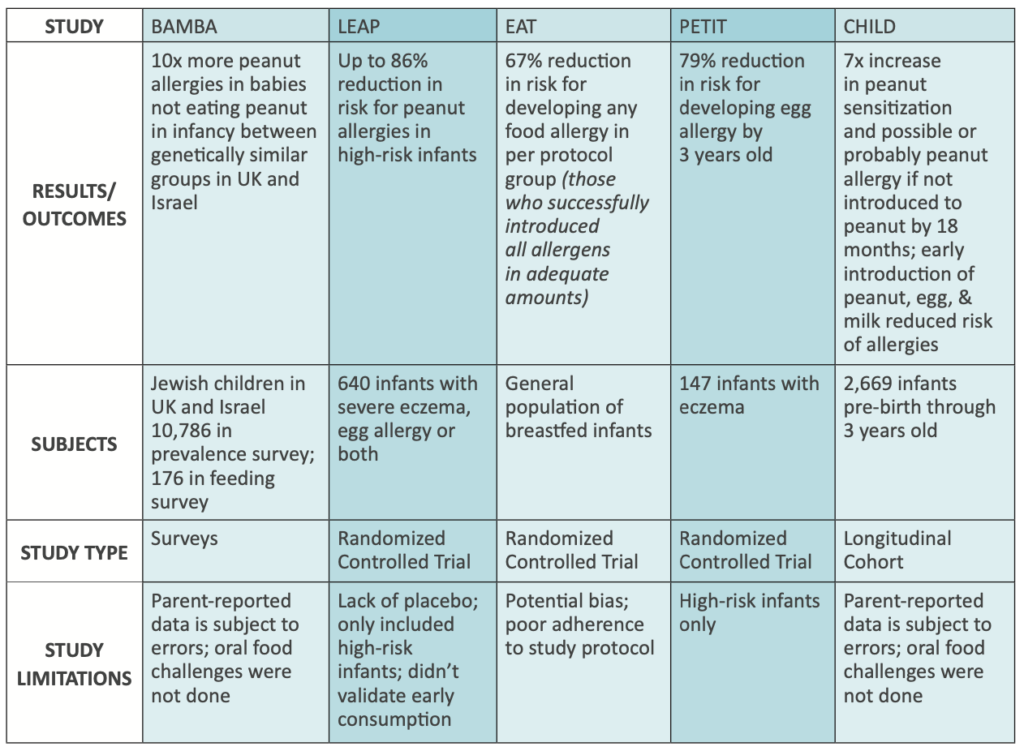Key Messages
- Evidence supports the early introduction of infant- safe peanut foods and eggs starting as early as
4 to 6 months of age to reduce the risk of allergies to these foods. “Early and often” is the mantra for when to feed babies potential allergens. - Infants with severe eczema or an existing food allergy are considered at risk for developing food allergies and the introduction of potential allergens should first be discussed with a healthcare provider.
For those of us who monitor research for evidence-based clinical practice, changes in recommendations are inevitable. As any area of health and nutrition is researched, experts evolve their practice as new things are learned. Yet, every time there are big changes in clinical guidelines, it takes time for those changes to become the standard of care. For the latest recommendations on early feeding of potentially allergenic foods, this is certainly the case. To understand the latest recommendations for feeding peanut foods as early as 4 to 6 months and egg and other allergens within the first year, we need to understand how we got here.
In the late 1990s, pediatricians and researchers noticed a troubling increase in the rates of food allergies in children. Because of this increase, experts including the American Academy of Pediatrics (AAP) recommended withholding potential allergens from high-risk infants for one, two or three years in guidance released in 2000.1 However, in 2008, these recommendations were rescinded because the evidence did not support withholding as a means to prevent food allergies.2 Meanwhile, researchers began trying to unravel the mystery of how early diet may influence the development, or protect against, food allergy development. Here are some of the groundbreaking studies that have shaped current guidelines.
- In 2008, Du Toit, et al. reported that Jewish children in the United Kingdom who did not eat peanut foods in the first year had a 10-fold higher rate of peanut allergy than those in Israel, whose mothers fed them high quantities of a peanut-containing weaning food.3
- In 2015, the Learning Early About Peanut (LEAP) allergies trial included 640 infants at high risk for peanut allergies (severe eczema and/or egg allergy), half of whom ate peanut foods early (starting between 4 to 11 months) and half of whom did not. At the end of 5 years, researchers found that those infants who started early had up to an 86% reduced risk of developing a peanut allergy.4
- In 2016, the Enquiring About Tolerance (EAT) study released results from 1,303 breastfed infants who either began to eat six commonly allergenic foods (peanut, egg, cow’s milk, sesame, whitefish, and wheat) starting at 3 months of age or introduced these foods according to standard recommendations. The EAT study proved that introducing potential allergens early was safe, but participants had trouble incorporating all of the allergenic foods in the full quantities. Those who did adhere to the protocol had lower rates of any food allergy.5
- In the PETIT study published in 2017, a randomized controlled trial where 147 high-risk infants (with severe eczema) were randomized to eat heated egg powder in a two-step introduction.6 The results showed that early introduction of baked egg protein reduces the risk of egg allergy in participants and the study was stopped early because of such significant results.
- In 2020, the CHILD study, which followed 2,669 children from birth to 3 years, showed that delaying introduction of peanut, egg, or milk past 12 months resulted in a significant increase in the risk for developing allergies to these foods.7

Following the release of the LEAP study, an international consensus was published about the early introduction of peanut foods.8 This consensus was followed by clinical guidelines published by the National Institutes of Allergy and Infectious Disease recommending the introduction of peanut foods as early as 4 to 6 months, based on infant risk.9 In 2019, the AAP released revised recommendations to include the latest advice for 10 introducing peanuts and other allergens.10 Finally, the 2020 US Dietary Guidelines for Americans Advisory Committee reviewed all of the research and made their recommendation – feed babies a varied diet, with strong evidence for inclusion of peanut and moderate evidence for inclusion of egg to reduce the risk of allergy to these foods.11 After decades of confusion about the influence of early feeding, we finally have research that helps navigate this important time. At least for peanut and egg, we now know that these foods should be eaten early and often.
Sherry Coleman Collins, MS, RDN, LD is a metro-Atlanta based registered dietitian nutritionist and expert in food allergies. Coleman Collins works as a consultant for National Peanut Board. She can be found on social media as @PeanutRD on Twitter and Instagram.
Photo credit: Kenan Hill
References
- Committee on Nutrition. Hypoallergenic infant formulas. Pediatrics. 2000;106:346-349.
- Greer, FR, et al. Effects of early nutritional interventions on the development of atopic disease in infants and children: The role of maternal dietary restriction, breastfeeding, timing of introduction of complementary foods, and hydrolyzed formulas. Pediatrics. 2008;121:183-191.
- Du Toit, G, et al. Early consumption of peanuts in infancy is associated with a low prevalence of peanut allergy. J Allergy Clin Immunol. 2008;122:984-991.
- Du Toit, G, et al. Randomized trial of peanut consumption in infants at risk for peanut allergy. N Engl J Med. 2015;372:803-813.
- Perkin, MR, et al. Randomized trial of introduction of allergenic foods in breast-fed infants. N Engl J Med. 2016;374:1733-1743.
- Natsume, O, et al. Two-step egg introduction for prevention of egg allergy in high-risk infants with eczema (PETIT): a randomized, double-blind, placebo controlled trial. Lancet. 2017;10066:21-27.
- Simons, E, et al. Timing of introduction, sensitization, and allergy to highly allergenic foods at age 3 years in a general-population Canadian cohort. J Allergy Clin Immunol: In Practice. 2020;8:166-175.
- Fleischer, D, et al. Consensus communication on early peanut introduction and the prevention of peanut allergy in high-risk infants. Pediatrics. 2015;136:600-604.
- National Institute of Allergy and Infectious Diseases-Sponsored Expert Panel. 2017 Addendum guidelines for the prevention of peanut allergy in the United States. Version current 24 October 2018. Internet: https:// www.niaid.nih.gov/diseases-conditions/guidelines-clinicians-and- patients-food-allergy (accessed August 25, 2020).
- Greer, FR, et al. The effects of early nutritional interventions on the development of atopic disease in infants and children: The role of maternal dietary restriction, breastfeeding, hydrolyzed formulas, and timing of introduction of allergenic complementary foods. Pediatrics. 2019;121:346.
- Dietary Guidelines Advisory Committee. Scientific Report of the 2020 Dietary Guidelines Advisory Committee: Advisory Report to the Secretary of Agriculture and the Secretary of Health and Human Services. 2020.

